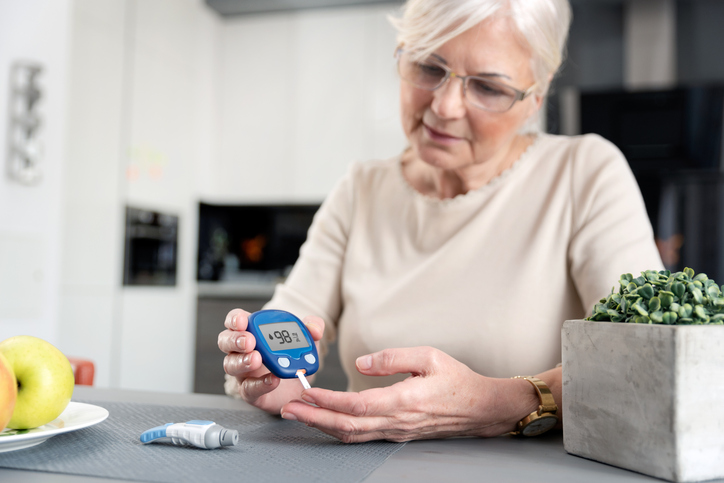Auburn professor says COVID-19 can cause serious complications for diabetics
Article body
Robert Judd, professor of pharmacology and chair of the Boshell Diabetes and Metabolic Disease Research Program in Auburn’s College of Veterinary Medicine, discusses the importance of preventative measures for diabetics and how COVID-19 increases the risk of serious complications for these patients.
Are people with diabetes and other metabolic diseases at a higher risk for contracting COVID-19 or complications associated with the disease?
Strictly speaking, there does not appear to be enough data demonstrating that people with diabetes are more likely to get COVID-19 than the general population. However, based on currently available information and clinical expertise, if they contract the disease, they are likely to experience serious complications and their outcomes are often worse than people without diabetes. This is the case for other high-risk groups as well, including patients with lung disease, asthma or heart disease, or patients who are immunocompromised due to cancer treatment or autoimmune diseases. In Chinese COVID-19 patients, more diabetics developed serious complications from COVID-19 infection than the general population. This fits with previous studies demonstrating that diabetics are more susceptible to viral infections and associated complications in general. Specifically, poorly controlled diabetics were at greater risk, with well controlled diabetics having COVID-19 complications similar to the general population. There does not appear to be a difference between type 1 and type 2 diabetics as far as complications to COVID-19 are concerned.
Why are diabetics at higher risk for complications associated with COVID-19?
Poorly controlled diabetics with above-target blood sugars experience increased inflammation. Such inflammation is also frequently observed in viral infections such as COVID-19. When combined, COVID-19 and poorly controlled diabetes can significantly increase inflammation throughout the body and especially in the lungs which can lead to bronchial hyperactivity and associated dysfunction. The resulting “perfect storm” can cause the lungs to be more susceptible to respiratory infections from bacterial and viral sources.
There have been reports of low or no available basic healthcare products, such as rubbing alcohol and alcohol swabs, that are critical for diabetic testing. Can you suggest alternatives for these products that could help high-risk patients reduce or eliminate the amount of time spent out of their homes searching for these necessary items?
It is true that diabetic patients have struggled to find rubbing alcohol and other supplies during the COVID-19 pandemic. Rubbing alcohol is commonly used by diabetics for insulin injections, glucose monitoring and cleaning insulin pump sites. Even though rubbing alcohol is in limited supply, diabetics are encouraged to search stores and online retailers for the needed products and make efforts to conserve when possible. It is important to note that recent studies have demonstrated no increased risk of infection for single-use syringes, pen needles or lancets when alcohol is not used to clean the area prior to injection. This led the American Association of Diabetes Educators in 2019 to recommend disinfection of the injection site with alcohol only if the site is dirty or if the injection is being administered in an institutional environment. Instead, diabetics should wash both the insulin injection site and their hands with water and soap (not anti-bacterial), then allow to air dry.
What actions can people with diabetes and other metabolic diseases do to reduce their risk?
The best thing that everyone, including people with diabetes, can do to reduce their risk is to the follow CDC guidelines including frequent hand washing and social distancing. In addition, it is important that diabetics pay special attention to controlling their glucose levels during this time, as data appear to demonstrate that poorly controlled diabetics are at greater risk for complications. Healthy family members should be especially vigilant around vulnerable household members regarding handwashing and cleaning in general. If possible, vulnerable family members should reside in a protected area of the home, limiting contact with others. Contact your doctor if you are experiencing COVID-19-related symptoms or are unable to control your blood glucose levels.
Where can I find relevant information for diabetic patients related to COVID-19?
The best overall source of information about COVID-19 is the CDC’s website. For information about COVID-19 that is directly related to diabetics, visit the American Diabetes Association’s coronavirus website.
About Robert Judd:
Robert Judd is a professor of pharmacology and the chair of the Boshell Diabetes and Metabolic Disease Research Program in Auburn University’s College of Veterinary Medicine. His major research interests center around new treatments for type 2 diabetes. The Boshell Program has more than 50 Auburn faculty members dedicated to improving the lives of all people with diabetes through research and interdisciplinary programs.
Auburn University is a nationally ranked land grant institution recognized for its commitment to world-class scholarship, interdisciplinary research with an elite, top-tier Carnegie R1 classification, life-changing outreach with Carnegie’s Community Engagement designation and an undergraduate education experience second to none. Auburn is home to more than 30,000 students, and its faculty and research partners collaborate to develop and deliver meaningful scholarship, science and technology-based advancements that meet pressing regional, national and global needs. Auburn’s commitment to active student engagement, professional success and public/private partnership drives a growing reputation for outreach and extension that delivers broad economic, health and societal impact.






